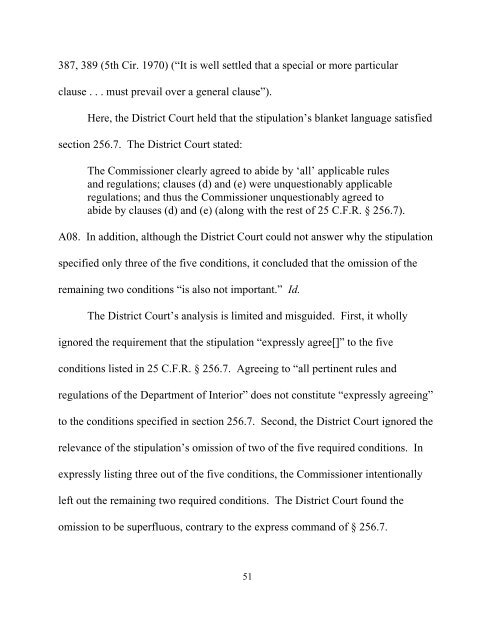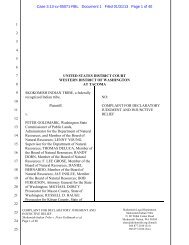Appellant Brief - Turtle Talk
Appellant Brief - Turtle Talk
Appellant Brief - Turtle Talk
You also want an ePaper? Increase the reach of your titles
YUMPU automatically turns print PDFs into web optimized ePapers that Google loves.
387, 389 (5th Cir. 1970) (“It is well settled that a special or more particular<br />
clause . . . must prevail over a general clause”).<br />
Here, the District Court held that the stipulation’s blanket language satisfied<br />
section 256.7. The District Court stated:<br />
The Commissioner clearly agreed to abide by ‘all’ applicable rules<br />
and regulations; clauses (d) and (e) were unquestionably applicable<br />
regulations; and thus the Commissioner unquestionably agreed to<br />
abide by clauses (d) and (e) (along with the rest of 25 C.F.R. § 256.7).<br />
A08. In addition, although the District Court could not answer why the stipulation<br />
specified only three of the five conditions, it concluded that the omission of the<br />
remaining two conditions “is also not important.” Id.<br />
The District Court’s analysis is limited and misguided. First, it wholly<br />
ignored the requirement that the stipulation “expressly agree[]” to the five<br />
conditions listed in 25 C.F.R. § 256.7. Agreeing to “all pertinent rules and<br />
regulations of the Department of Interior” does not constitute “expressly agreeing”<br />
to the conditions specified in section 256.7. Second, the District Court ignored the<br />
relevance of the stipulation’s omission of two of the five required conditions. In<br />
expressly listing three out of the five conditions, the Commissioner intentionally<br />
left out the remaining two required conditions. The District Court found the<br />
omission to be superfluous, contrary to the express command of § 256.7.<br />
51

















